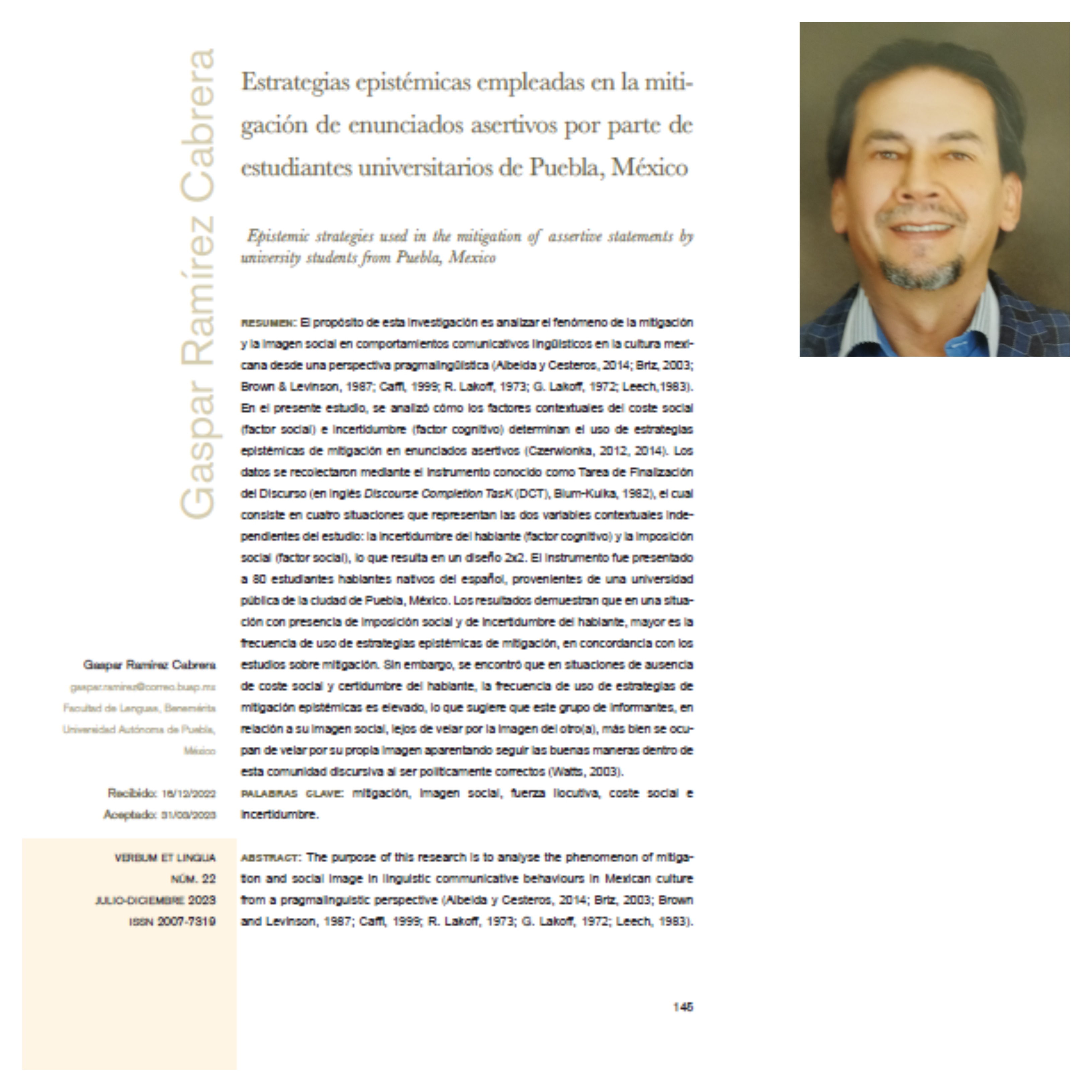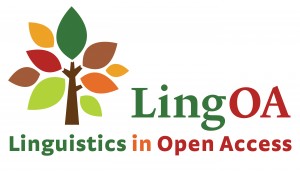Epistemic strategies of mitigation in assertive utterances in university students from Puebla, Mexico
DOI:
https://doi.org/10.32870/vel.vi22.215Keywords:
mitigation, social image, illocutionary force, social imposition, uncertaintyAbstract
The purpose of this research is to analyse the phenomenon of mitigation and social image in linguistic communicative behaviours in Mexican culture from a pragmalinguistic perspective (Albelda y Cesteros, 2014; Briz, 2003; Brown and Levinson, 1987; Caffi, 1999; R. Lakoff, 1973; G. Lakoff, 1972; Leech, 1983). In the present study, it was analysed how the contextual factors of social cost (social factor) and uncertainty (cognitive factor) determine the use of epistemic mitigation strategies in assertive statements (Czerwionka, 2012, 2014). Data were collected using the instrument known as Discourse Completion Task (DCT) (Blum-Kulka, 1982), which consists of four situations that represent the two independent contextual variables of the study, namely, the uncertainty of the speaker (cognitive factor) and social imposition (social factor), resulting in a 2x2 design. The instrument was presented to 80 native Spanish-speaking students from a public university in the city of Puebla, Mexico. The results show that the greater the social cost and the greater the uncertainty, the greater the presence of epistemic mitigation strategies in accordance with the studies on mitigation. However, it was also found that there is an upward trend in the use of epistemic mitigation strategies even in situations with a lower degree of imposition and certainty of the speaker. This suggests that this group of informants, in relation to their social image, far from looking after the image of the other, they rather take care of looking after their own image, pretending to follow good manners within this discursive community by being politically correct (Watts, 2003).
Downloads
References
Albelda, M. (2010). ¿Cómo se reconoce la atenuación? Una aproximación metodológica basada en el español peninsular hablado. Descortesía en español Espacios teóricos y metodológicos para su estudio. (Italia): EDICE. : 47 - 70
Albelda, M. y Cestero A. M. (2011). De nuevo, sobre los procedimientos de atenuación lingüística, Español Actual, 96.: 121-155.
Albelda, M., Briz, A., Cestero A. M., Kotwica D., y Villalba C. (2014). Ficha metodológica para el análisis pragmático de la atenuación en corpus discursivos del español. Revista Oralia.
Briz, A. (2003). “La estrategia atenuadora en la conversación cotidiana española”, Actas del Primer Coloquio del programa Edice. “La perspectiva no etnocentrista de la cortesía: identidad sociocultural de las comunidades hispanohablantes”, en D. Bravo (ed.). Estocolmo. Universidad de Estocolmo, 17-46.
Briz, A (2005). Eficacia, imagen social e imagen de cortesía Naturaleza de la estrategia atenuadora en la conversación cotidiana española, Estudios de la (Des)Cortesía en Español Categorías conceptuales y aplicaciones a corpora orales y escritos (pp. 53-92). Programa EDICE.
Briz, A. (2007). Para un análisis semántico, pragmático y sociopragmático de la cortesía atenaudora en España y América, en Lingüística Española Actual, vol. XXIX/1, págs. 5-44.
Blum-Kulka, Sh. (1982). Learning how to say what you mean in a second language: A study of speech act performance of learners of Hebrew as a second language. Applied Linguistics 3. 29-59.
Brown, P & S. Levinson. (1978), Universal in language usage: Politeness Phenomena, Cambridge, Cambridge University Press.
Brown y Levinson (1987). Politeness. Some universals in language usage, Cambridge, Cambridge University Press.
Caffi, C. (1999). On mitigation. Journal of Pragmatics, 31: 881-909.
Camacho Gómez, Manuela (2013). Culturas negociadoras en México e Italia: Una aproximación comparativa. Semestre Económico. [online]., vol.16, n.34 [cited 2023-06-01], pp.169-192. Available from: <http://www.scielo.org.co/scielo.php?script=sci_arttext&pid=S0120-63462013000200008&lng=en&nrm=iso>. ISSN 0120-6346.
Czerwionka, Lori A. (2010), Mitigation in Spanish Discourse: Social and Cognitive Motivations, Linguistic Analyses, and Effects on Interaction and Interlocutors. Dissertation presented to the Faculty of the Graduate School of the University of Texas at Austin
Czerwionka, Lori A. (2012). Mitigation: The combined effects of imposition and certitude. Journal of Pragmatics, 44, 1163-1182.
Czerwionka, Lori A. (2014). Participant perspectives on mitigation: The impact of imposition and certainty. Journal of Pragmatics, 67, 112-130.
Fraser, Bruce. (1976). Conversational mitigation. Journal of Pragmatics 4: 341-350.
Fraser, Bruce. (2010). Pragmatic Competence: The Case of Hedging. New approaches to Hedging. Studies in Pragmatics 9. 15-34. Emerald.
Félix-Brasdefer, J. César. (2006). Linguistic politeness in Mexico: Refusal strategies among male speakers of Mexican Spanish. Journal of Pragmatics 38 (2006) 2158–2187.
Grice, Paul. (1975), Lógica y Conversación, en L. Valdés (Ed.), La búsqueda del significado, Madrid, Tecnos/Universidad de Murcia, pp. 511-530.
Henk Haverkate. (1994). La cortesía verbal. Estudio pragmalingüístico. Gredos, Madrid. 245 pp. 45. 475.
Hübler, A. (1983). Understatements and hedges in English, Amsterdam: John Benjamins.
Jaffe, Alexandra. (2009). Introduction: The Sociolinguistics of Stance. Stance. Sociolinguistic Perspectives. Oxford Studies in Sociolinguistics. (pp. 3-28).
Lakoff, Georges (1972). Hedges: A study in meaning criteria and the logic of fussy concepts. Papers from the English Regional Meeting of the Chicago Linguistic Society.: 183,228.
Lakoff, Robin (1973). The logic of Politeness; or minding your p’s and q’s. Papers from the ninth regional meeting, Chicago, Chicago Linguistic Society.: 292-305.
Prince, E. J. Frader y C. Bosk. (1982). On hedging in physician-physician discourse, en R. J: Di Pietro (ed.), Linguistics and the Professions. Proceedings on the Second Annual Delaware symposium on language studies: 83-97.
Sperber, D. & Wilson, D. (1986) Relevance: Communication and Cognition. Oxford: Blackwell. (Second edition 1995.)
Scollon, Ron, Scollon, Suzanne W., 2001. Intercultural Communication, second ed. Blackwell, Malden, MA.
Watts, Richard. (2003). Politeness. Cambridge University Press, Cambridge.

Downloads
Published
Versions
- 2024-08-30 (2)
- 2023-07-01 (1)












